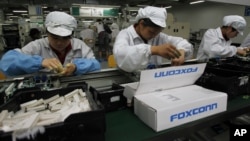Manufacturing giant Hon Hai Precision has long churned out iPads and iPhones with inexpensive labor in China. Now the global high-tech contractor plans to replace workers with potentially thousands of robots. The move has been applauded by both economists and even a normally critical labor rights group, who say it would save Hon Hai money and ease workplace disputes.
Taiwan's contract electronics maker Hon Hai employs about one million workers at factories in China, to make products for the world’s top electronics brands. But company CEO Terry Gou told reporters last month Hon Hai needs just three years to automate 70 percent of its product assembly. He said that shift would replace people with machines and improve efficiency.
Jamie Wang, a principal research analyst with the market research firm Gartner in Taipei, called automation a trend that Hon Hai cannot ignore.
She said the company must use robots to replace some of the manufacturing process. She added that Hon Hai's major client Apple is planning to go in this direction, so they must make arrangements to meet client needs and for their own future labor costs. Over the next 10 to 20 years, Wang said, companies cannot use manual labor to do manufacturing all the time.
Hon Hai's chairman had said in 2011 the company would replace some of its workers with one million robots. Two years later the company said it would spend $40 million on researching and manufacturing robotics in the U.S. state of Pennsylvania.
Hon Hai, also known as Foxconn, faces stiffening competition for contract work as wages rise in China, a trend that has prompted many multinationals to expand production in Southeast Asia instead. Wages rose 13 percent last year. Factories in eastern China also struggle to fill jobs as rising costs of living send workers to cheaper but less developed inland cities. China's foreign direct investment, primarily in manufacturing, grew at a particularly slow two percent last year.
Liang Kuo-yuan, chairman of the Yuanta-Polaris Research Institute in Taipei, said automation is all but required of a company of Hon Hai's size.
He said Hon Hai itself is a very large manufacturer and that its production scale is really big. So, Liang said, in an environment of rising costs and labor shortages, the company must move toward automation.
Use of robots would also reduce Hon Hai's risk of labor disputes in China. Worker suicides and protests over workplace conditions during the past five years have hurt the company's reputation. Now Chinese workers no longer depend on the likes of Hon Hai for jobs.
Geoff Crothall, spokesman for the China Labor Bulletin advocacy group in Hong Kong, said fewer workers are applying at Hon Hai now than in years past. He said people prefer to stay in school for higher degrees or work in different types of jobs as the country's economy diversifies.
“You don’t have queues of workers lining up around the block anymore trying to get into a Foxconn factory. There are many workers who are looking for better jobs elsewhere. China’s population growth is slowing down. There are less people leaving school and going directly into work. Many more are staying in school longer and also there are more job opportunities away from these factories,” said Crothall.
Hon Hai, which declined VOA requests for details on its automation plans, has been pulling away from the China job market in other ways over the past three years.
The company, with $130 billion in annual revenues, hopes to grow in the United States and also open a $1 billion research and development center in Jakarta. It’s also tipped to make more electronics under its own brand, including smartphones and electric vehicles.




